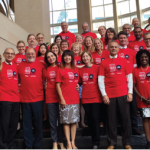ACR advocates recently returned to Capitol Hill to meet with members of Congress as part of the Advocates for Arthritis fly-in conference on Sept. 26. This annual event brings together rheumatology professionals to advocate on behalf of the rheumatology community. Core issues on which the advocates focused this year include lowering the out-of-pocket cost of…








